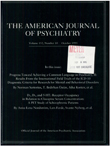Rethinking Oedipus: an evolutionary perspective of incest avoidance
Abstract
The author presents a biological hypothesis of incest avoidance. Pertinent literature from evolutionary biology, ethology, anthropology, and clinical research is reviewed. Secure early bonding to immediate kin predicts later adaptive kin-directed behaviors, including preferential altruism (kin selection) and incest avoidance. Impaired bonding predicts aberrant kin-directed behavior, including diminished altruism, neglect, and an increased incidence of incest. Failed bonding predicts the highest frequency of incest. Secure bonding to kin may function to establish adaptive kin-directed behaviors, including incest avoidance. Bonding is conceived of as the developmental foundation of a form of social attraction, here called "familial attraction," which is evolutionarily distinct from sexual attraction.
Access content
To read the fulltext, please use one of the options below to sign in or purchase access.- Personal login
- Institutional Login
- Sign in via OpenAthens
- Register for access
-
Please login/register if you wish to pair your device and check access availability.
Not a subscriber?
PsychiatryOnline subscription options offer access to the DSM-5 library, books, journals, CME, and patient resources. This all-in-one virtual library provides psychiatrists and mental health professionals with key resources for diagnosis, treatment, research, and professional development.
Need more help? PsychiatryOnline Customer Service may be reached by emailing [email protected] or by calling 800-368-5777 (in the U.S.) or 703-907-7322 (outside the U.S.).



